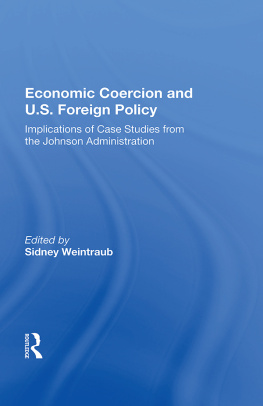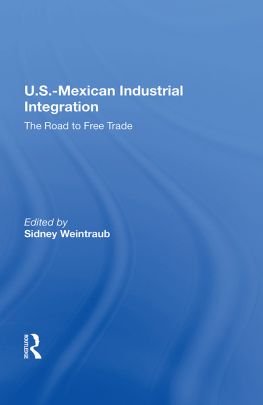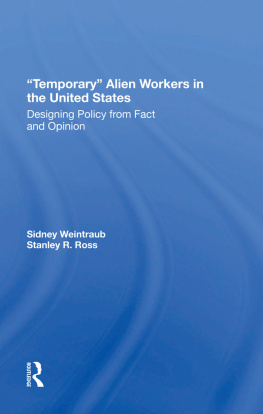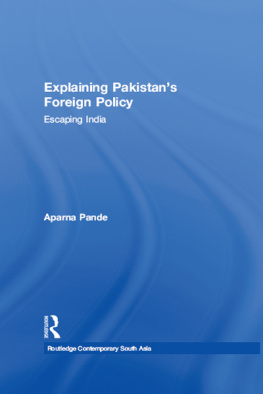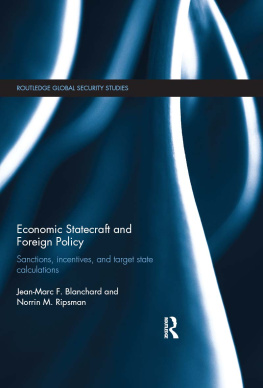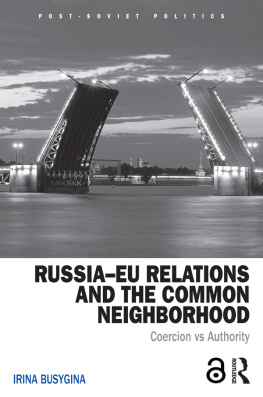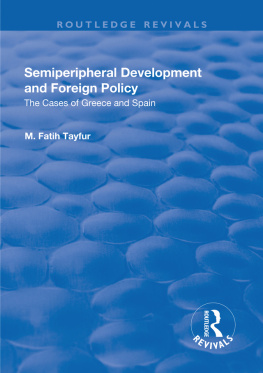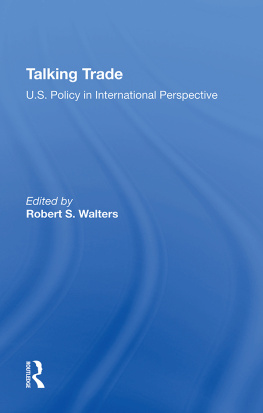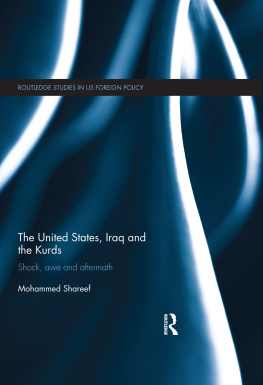Economic Coercion and U.S. Foreign Policy
Also of Interest
U.S. Foreign Policy and the New International Economic Order: Negotiating Global Problems, 19741981, Robert K. Olson
U.S. Foreign Policy and Multilateral Development Banks, Jonathan E. Sanford
* U.S. Policy in International Institutions: Defining Reasonable Options in an Unreasonable World, updated and revised, edited by Seymour Maxwell Finger and Joseph R. Harbert
* World Power Trends and U.S. Foreign Policy for the 1980s, Ray S. Cline
* Change in the International System, edited by Ole R. Holsti, Randolph M. Siverson, and Alexander L. George
A Select Bibliography on Economic Development: With Annotations, John P. Powelson
* Presidential Decisionmaking in Foreign Policy: The Effective Use of Information and Advice, Alexander L. George
* The Theory and Structures of International Political Economy, edited by Todd Sandler
* Debt and the Less Developed Countries, edited by Jonathan David Aronson
* The Challenge of the New International Economic Order, edited by Edwin P. Reubens
* Available in hardcover and paperback.
Westview Special Studies in International Relations
Economic Coercion and U.S. Foreign Policy: Implications of Case Studies from the Johnson Administration
edited by Sidney Weintraub
Why do governmentsand especially the U.S. governmentso frequently attempt to use economic means to coerce other countries on a one-on-one basis when critics almost universally argue that such pressure rarely works? This question forms the basis of discussion for Professor Weintraub and seven graduate students at the Lyndon B. Johnson School of Public Affairs. The conclusion they reach, after examining six case studies of economic coercion during the term of President Johnson, is that such methods are used because they often do work, particularly when the actual motives for the economic sanctionsas opposed to the stated, official objectivesare considered.
Basing their study on the original documents available in the LBJ Presidential Library, the authors found that although in only one of the six cases studied did the government meet its declared objective, in several others the actual objectives were in fact achieved. Real motives for economic coercion included domestic political issues, the need to assuage allies, and the desire to give the leaders of another country an excuse to do what they wished.
Sidney Weintraub is Dean Rusk Professor in the Lyndon B. Johnson School of Public Affairs at the University of Texas at Austin. Prior to coming to the LBJ School in 1976 he had a distinguished career with the U.S. Department of State. David Berteau, Carolyn Castore, John Craddock, Mark David, Robert Kleeman, Mark Richardson, and Jay Schenirer are graduate students at the LBJ School who worked with Professor Weintraub on this study.
First published 1982 by Westview Press
Published 2018 by Routledge
52 Vanderbilt Avenue, New York, NY 10017
2 Park Square, Milton Park, Abingdon, Oxon OX14 4RN
Routledge is an imprint of the Taylor & Francis Group, an informa business
Copyright 1982 by Taylor & Francis
All rights reserved. No part of this book may be reprinted or reproduced or utilised in any form or by any electronic, mechanical, or other means, now known or hereafter invented, including photocopying and recording, or in any information storage or retrieval system, without permission in writing from the publishers.
Notice:
Product or corporate names may be trademarks or registered trademarks, and are used only for identification and explanation without intent to infringe.
Library of Congress Cataloging-in-Publication Data
Main entry under title:
Economic coercion and U.S. foreign policy.
(Westview special studies in international relations)
An LBJ School policy study.
Bibliography: p.
Includes index.
1. United States Foreign economic relations Case studies. 2. United States
Foreign relations 19631969 Case studies. I. Weintraub, Sidney, 1914
II. Series.
HF1455.E32337.738116103
ISBN 0-86531-325-3AACR2
ISBN 13: 978-0-367-01901-3 (hbk)
This examination of the use of economic coercion by the United States to achieve foreign policy objectives was undertaken because of the realization that the use of such coercion is pervasive but at the same time is studied only when the case involved is spectacular. Most instances of U.S. coercion are not spectacular and indeed rarely are reported in the press in the United States. The presence of the Lyndon B. Johnson Presidential Library offered an opportunity to delve into original documents of cases that may not have been page-one news in the United States. The purpose was twofold: to examine enough cases to extend the theory of economic coercion; and to provide assistance to U.S. policymakers. Our examination looked to the past, but our intention is to guide future actions.
As the researchers pored through thousands of presidential documents pertaining to the 1960s, we were besieged by the present. Iranian nationalists seized hostages in the U.S. Embassy in Teheran, a form of noneconomic coercion, and the United States responded economically by cutting off trade, curtailing oil imports from Iran, and seizing Iranian assets under U.S. control. The Soviet Union invaded Afghanistan, again a form of noneconomic coercion, and the United States responded both symbolically by not participating in the Olympics in Moscow and economically by limiting grain exports to the Soviet Union. The United States suspended aid to Nicaragua to coerce the government of that country to cease being a transshipment point for arms for rebels in El Salvador.
The Soviet action in Afghanistan was instructive. When economic coercion fails, force can be applied. This is the current fear in Poland. Economic coercion obviously is not the ultimate weapon. During the presidential campaign, Ronald Reagan hinted that the way to respond to the Soviet invasion of Afghanistan might be to blockade Cuba, a recognition that the trade embargo against Cuba (economic coercion) did not have the same drastic effect as would a blockade (military coercion). We do not use military coercion very much any more. Ronald Reagan did not use it against Cuba over Afghanistan after he became President. If we are to coerce with more than symbols, therefore, we have little choice other than to use economic tools.
The use of economics to achieve foreign policy goals runs the gamut from the benign to the malign, from consultation with other countries to persuasion, negotiation, pressure, and coercion, with many steps between each of these and a shading of distinctions as one moves from one level to a deeper one. The cessation of military aid to Turkey over its behavior in Cyprus was clearly coercive in intent. The imposition of economic conditions on Turkey as a quid pro quo for providing economic assistance is similarly coercive, but the word coercion sounds a bit harsh in this instance. The International Monetary Fund imposes conditions for much of its financial assistance and the recipient country must either accept these or forego the funds. Depending on ones semantic taste, this can be called anything from negotiation to coercion. The same can be said for an earlier U.S. foreign aid practice when it provided program loans. These loans were disbursed in quarterly tranches, conditioned on the recipient country meeting specific performance criteria. Again, the exact terminology one prefers depends on the predilection of the beholder. I intend to use the word coercion to describe such actions, although I recognize that some measures are more coercive than others.

